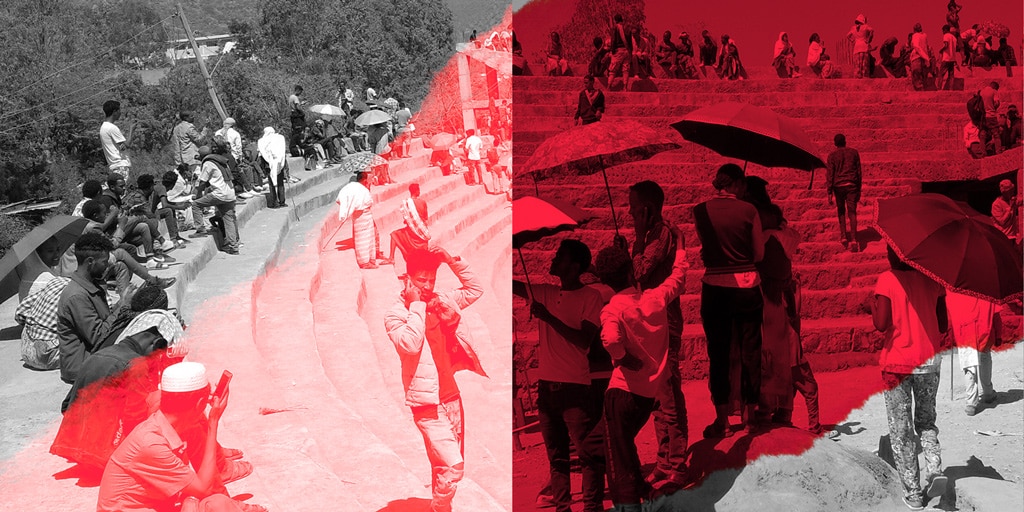Since November 2020, Ethiopia’s Tigray region has suffered a communications blackout affecting phone lines and internet services amidst one of the most lethal conflicts in the world. The shutdown’s impact has been devastating, allowing sweeping human rights abuses to take place under the cover of darkness and cutting people off from their families and services essential to their survival.
Explore our Voices from Tigray series for first-hand accounts of the shutdown’s impact:
As host of the 17th annual Internet Governance Forum (IGF) in November 2022, the government of Ethiopia came under enormous pressure from activists and stakeholders around the globe calling for an end to the years-long internet blackout in Tigray.

In the days following IGF 2022 and in the midst of ongoing peace talks, authorities began taking incremental steps to restore access to telecommunications and other essential services throughout Tigray, including announcements from Ethio Telecom that it would begin efforts to restore infrastructure destroyed during the conflict. In January 2023, Ethio Telecom said it had repaired 981 out of the 1,800 kilometers of damaged fiber. A federal government spokesperson also indicated that critical infrastructure had been repaired and telecom services restored in 51 towns in Tigray. Neither the government or Ethio Telecom has provided a timeline for when full access will be restored.
In reality, many people in Tigray still remain digitally cut off, and those who have regained some access are largely struggling with slow speeds and limited 2G services. For a start, reports indicate telephone communications have been restored across the region, but internet access is lagging behind, and the full impact of this restoration is yet to be felt by all of Tigray’s over six million population. Some Ethiopians in the diaspora and outside of Tigray have confirmed they were able to connect with their loved ones in Tigray for the first time after several years. Those who have been reconnected to the internet have expressed mixed feelings of anger and disappointment for the events they have suffered and for the ongoing struggles to get the rest of their communities online, while those who remain disconnected wait in hope and despair to be able to digitally connect with their loved ones soon.
The prolonged internet shutdown in Tigray has been an unequivocal human rights disaster. It has left businesses, schools, hospitals, and other critical services in shambles, and prevented delivery of humanitarian aid to a region overwhelmed by famine. It has cut people off from potentially life-saving information throughout the conflict, and made it extremely difficult for affected communities and their advocates to hold perpetrators of war crimes and human rights violations to account.
It is essential at this moment, as the people of Tigray and other affected communities work toward rebuilding their lives, that access to the internet and other critical services is swiftly restored.
We call on the government of Ethiopia to take all steps necessary to ensure full internet access is available to all, committing to an urgent timeline and providing clear and transparent information about its progress along the way.
Looking forward, both the Ethiopian government and other relevant stakeholders should commit to #KeepItOn, ensuring internet shutdowns, fundamental violations of human rights, are left in the past.
Going forward, the government of Ethiopia must make stronger commitments to uphold fundamental human rights by refraining from weaponizing internet shutdowns even in times of crisis. Regional blocks and institutions like the African Union and the Economic Community of West African States (ECOWAS) must prioritize digital rights and internet freedom and urge member states to adhere to resolutions or court rulings that denounce the use of internet shutdowns.
Moreover, our monitoring has shown that internet shutdowns are counterproductive, violate rights, and water down development and digitization efforts. International development bodies like the World Bank and International Monetary Fund (IMF), foreign governments, and private companies that provide funding to boost digitization and digitalization efforts in growing democracies must make funding contingent upon respect for digital rights by taking a strong stand against internet shutdowns.
As Ethiopia works towards opening up its telecommunication market, internet service providers (ISPs) and telcos looking to enter the Ethiopian market must include strong safeguards against the use of internet shutdowns as part of their terms of entry.
Further, social media platforms who have failed to properly moderate content have created dangerous incentives for governments to resort to blunt force instruments like internet shutdowns when dealing with incitement to violence online. This also provides an easy excuse for governments to rely on when seeking coverage for shutdowns intended to restrict access to information. These companies must recover from their past failures in Ethiopia and across the region, and must invest in proper human content moderation, especially in conflict-affected areas.
For anyone who has personally been affected by the internet shutdown in Tigray, we invite you to share your story with us, either in English or in Tigrinyna.
